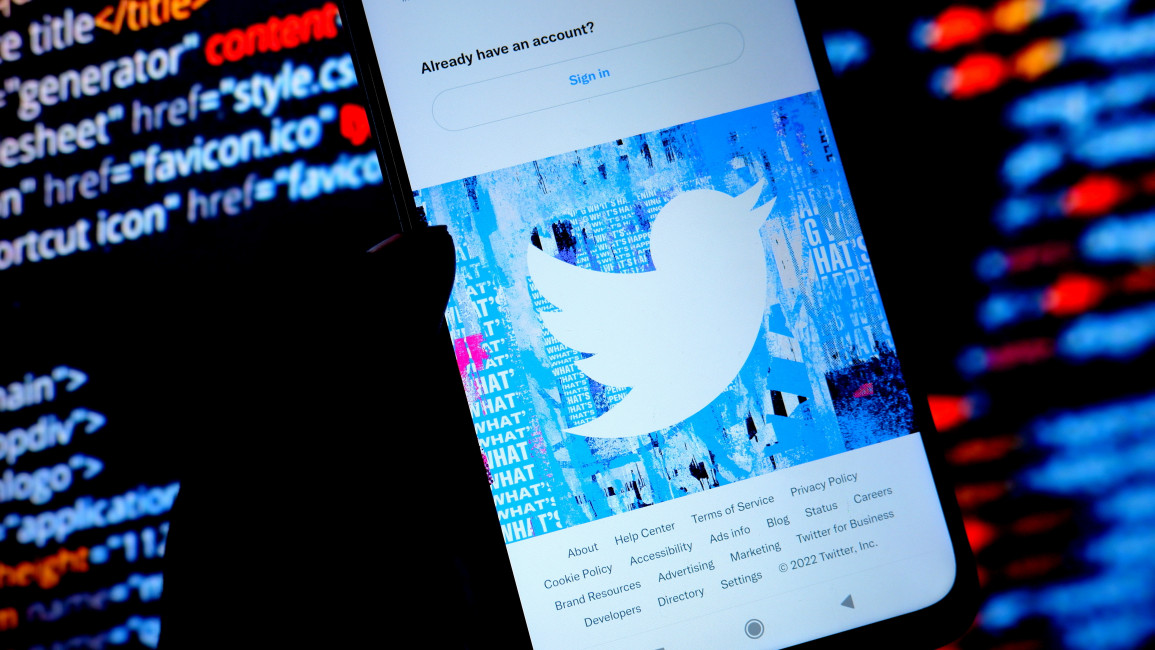Nooran Alhamdan
01 Jul, 2022
The use of bots to troll Palestinians online is part of a systematic targeting campaign. But all the harassment and intimidation will not deter activists, who are committed to revealing the truth that Israel fears, writes Nooran Hamdan.

Thousands of fake Twitter accounts began following Palestinian activists online in a targeted harassment campaign. [Getty]
One night, at the height of my final semester of graduate school, I was having a sleepless night. I don’t remember why I was tossing and turning, but I remember after an hour of frustrated attempts to sleep, I found myself mindlessly scrolling Twitter. Through squinted eyes, I noticed that my Twitter notifications were lighting up consistently, the blue signal indicating that I had over twenty notifications every few minutes.
I clicked my notifications tab and jolted up. I had row upon row of updates about new followers. I was perplexed. Had I tweeted something that had gone viral? How were so many people finding my account? I clicked one of the accounts that had followed me, and noticed their account was created that month. They had zero followers, what seemed to be a random photo as their profile picture, and they only followed Palestinian or pro-Palestine solidarity accounts.
The rest of my night remained sleepless. I browsed the hundreds of accounts that followed me and they all shared similar traits; newly created, only following Palestinian accounts, and obviously fake. At one point, I had to make my account private in order to be able to catch up with blocking the bot accounts without getting followed by a new batch of them.
"Being a Palestinian woman on Twitter, where I engage in digital advocacy and utilise the platform for my academic work, has never been easy business"
I wasn’t alone. Other Palestinian Twitter users were dealing with the same thing. Marc Owen Jones, an expert on disinformation and digital authoritarianism in the Middle East, analysed the suspicious activity and concluded our worst fears.
These bots were part of a systematic targeting campaign. The goal of these bots is to mass follow accounts and report them, until the account they are targeting is suspended. Owens even argues that the tactic acts as a “tool of surveillance and intimidation.”
Analysing the accounts following me in particular, Owens found that the 1156 bot accounts were being produced at a rate of 180 accounts every 3 minutes, a feat that is impossible without automation. 1090 of the 1156 accounts were suspended by Twitter.
Since I first experienced bot manipulation in late April, I have found that it has continued, although more sporadically and in fewer numbers. In this past week, I have noticed the activity emerging again, and I was quick to block the accounts.
Being a Palestinian woman on Twitter, where I engage in digital advocacy and utilise the platform for my academic work, has never been easy business. I have experienced a range of harassment and trolling over the years. And despite my large following, I know that I have it relatively easy compared to other Palestinians, who have been smeared by online blacklist websites that have the explicit goal of making the professional lives of Palestinian-Americans extremely difficult.
While I am thankful to have avoided more libellous and bad faith internet attacks, I cannot pretend that I am not uncomfortable being targeted. There is something especially eerie about the artificial bots that follow me. They are a reminder that someone always has their eyes on me; on my account and on the work that I do. What is most unsettling is not knowing exactly who is behind them.
While Israel and its cyberarm are likely a safe bet, I still wonder who would be so concerned about my account that they feel compelled to surveil me in this way. I am a 24 year old student. I engage in organising for the Palestinian cause in my own ways offline, which I do not advertise in any way whatsoever on my account. Most of my tweets are my unfiltered thoughts, informed by my family’s experience as Palestinian refugees and my understanding of politics given that I am deeply embedded in academic and advocacy spaces.
Despite the risks posed by being visibly Palestinian on Twitter and in other digital spaces, I will continue to persist. While I am honest in my discomfort at the feeling of being watched, I will always be committed to Palestinian liberation. Tweeting and speaking out about the genocide and settler-colonialism occuring in Palestine will always be what I consider to be the bare minimum that I can do as a Palestinian in the diaspora.
But more importantly, I ground myself in the reality that Israel is so intimidated by the work that I and other activists do, that mere tweets warrant the response that we have received in the latest form of bot manipulation. And this only motivates me.
"While I am honest in my discomfort at the feeling of being watched, I will always be committed to Palestinian liberation"
The truth scares Israel. Whether spoken in Palestine, in the United States, or in digital spaces. And that should only empower us all further; to keep speaking about Palestine, to keep Gaza Masafer Yatta and Sheikh Jarrah trending on Twitter, to keep posting about Ahmad Manasra, to keep the momentum of digital global solidarity with Palestinians.
They blacklist us, troll us, smear us, and send armies of bots to watch us because they fear the truth.
Nooran Alhamdan recently received her Masters degree in Arab Studies from Georgetown University.
Follow her on Twitter: @nooranhamdan
No comments:
Post a Comment